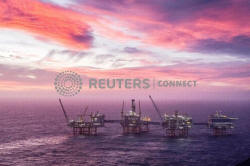Exclusive: Equinor considers more US asset sales in global strategy
revamp
 Send a link to a friend
Send a link to a friend
 [February 15, 2021] By
Dmitry Zhdannikov and Nerijus Adomaitis [February 15, 2021] By
Dmitry Zhdannikov and Nerijus Adomaitis
OSLO (Reuters) - Norway's Equinor is
looking to sell more assets in the United States and exit several other
countries as part of a major global reshuffle as it tries to return to
profit after writing down $25 billion of U.S. assets over the past
decade.
While the company, like other energy majors, has been hit by last year's
fall in oil and gas prices, Equinor's new head of international
business, Al Cook, said it lacked scale in the U.S. shale market and had
underestimated the strength of local competition.
Equinor disposed of its operated shale assets in the Eagle Ford in 2019,
and last week said it had agreed to sell its assets in the Bakken shale
oil province in the states of North Dakota and Montana for around $900
million.
"All our operated onshore positions in the U.S. are under the same kind
of review that we've done in the Bakken," Cook, told Reuters in an
interview.

"We've got an operated position in the Utica, we've got an operated
position in the Austin Chalk, those are under very active review right
now," he added.
As of the second quarter of 2020, Equinor had around 232,000 net acres
in the Appalachian Basin, including 27,000 acres it operates, and around
114,000 net acres in Louisiana Austin Chalk, roughly half of which is
operated.
Cook said Equinor was slow to realise U.S. production was not cost
effective at low oil prices as the country essentially took over OPEC's
swing producer role.
However, Equinor will keep and possibly expand its operations in the
Gulf of Mexico, its large non-operated position in Appalachian gas and
its wind business in the U.S. northeast - following a similar strategy
to that in the UK where it is a major gas supplier and wind power
producer.
"We think that can become a profitable, low carbon business which will
flourish under the kind of measures President Joe Biden is taking in the
U.S. ... and in time we will look at converting that natural gas into a
hydrogen business," Cook said.
"FAT CHICKEN, SHARP BEAKS"
Equinor currently has a presence in more than 20 countries outside
Norway, generating a third of its total production or around 700,000
barrels of oil equivalent per day.
[to top of second column] |

A view of the Johan Sverdrup oilfield in the North Sea, January 7,
2020. Carina Johansen/NTB Scanpix/via REUTERS

Cook - who joined Equinor in 2016 after a decade at BP, including working as
chief of staff for then CEO Bob Dudley - said that while he hopes overseas
output will rise, it was likely to be from fewer countries.
"With the low oil price, our chickens came home to roost, and we found out that
they've got very fat and they have very sharp beaks...and they caused a billion
dollar write downs."
Equinor has already exited or announced it will exit from around 10 countries
since the end of 2019, including South Africa, Indonesia, New Zealand, Uruguay,
Turkey, Australia and the United Arab Emirates.
In a major shift, it will no longer seek "material" operated onshore positions
abroad, but instead partner with experienced local operators such as Rosneft in
Russia, YPF in Argentina and Chesapeake in the Appalachian, Cook said.
It will also focus on previously developed areas with a faster return on
investment and less on frontier exploration.
"We can't do exploration where we say one day this would produce oil and gas,
because one day the world will not need all oil and gas," Cook said.
The company has recently written down the entire value of its liquefied natural
gas (LNG) development in Tanzania.
"We have to look at what we are good at. We are good at subsurface, we are
really good at finding oil and gas... we are good at offshore environments with
big waves and high winds," he said, adding that was a good fit with Norway, the
U.S. Gulf of Mexico, Brazil and the UK, as well as with Canada and Azerbaijan.

"We want to produce more, at least in the next decade, but we want to produce
with fewer emissions."
(Reporting by Nerijus Adomaitis; Editing by Kirsten Donovan)
[© 2021 Thomson Reuters. All rights
reserved.] Copyright 2021 Reuters. All rights reserved. This material may not be published,
broadcast, rewritten or redistributed.
Thompson Reuters is solely responsible for this content. |